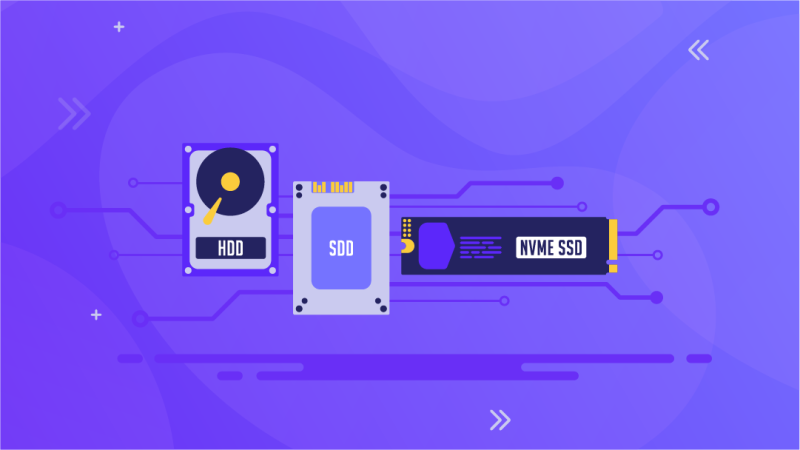Confused about the differences between HDDs and SSDs? Don’t know what to use for your web server or what hosting plan to pick based on them?
As a website owner, you will always want your website to be accessible and stable when your users visit it. A web server is just like a normal computer except that it is employed with the important task of hosting a website, its data and its software. A web hosting server is a computer that stores the files for a website. It also manages the traffic that is sent to and from the website. A web hosting server should be able to store as much data as possible in order to meet all of the site’s needs.
Like with any computer, multiple read and write operations must be performed each second except multiplied by over 1000 times! All this reading and writing takes place using the storage of the web server. Therefore, choosing the right storage type for your web hosting server is important. The speed of the website, security, and reliability all depend on it (read more here on how to make your website load faster). There are many factors that determine which type of storage device is best for a web hosting server.
Choosing the best storage type for your web hosting server is not an easy task. It all depends on your requirements and budget. However, we are here to make sure you can make the best-informed decision for yourself. The best storage type for web hosting services depends on the type of website you are running. For example, if you are running a blog or website that is not very demanding, then an SSD would be sufficient. However, if you are running a business that loads lots of heavy files or needs to have high-speed access to data and programs, then NVMe storage would be the best option.
Here’s an in-depth look at all three storage types so you can decide which one is best for you:
SSDs:
SSDs are solid-state drives. They are an optical storage medium as they are composed of different flash memory chips installed on a circuit board. They have faster read/write speeds when compared to HDDs as there are no moving parts but they are also more expensive than HDDs. SSDs are also much smaller in size which means there is less space for data storage so they don’t work well with large amounts of data storage needs. The SSD is often touted as the best storage type for web hosting servers. The reason is that SSDs are faster and they use less power than HDDs while also being more bulletproof. They are at least 10 times faster than hard drives, but they also cost more. This makes them a better choice because they are more efficient and cheaper in the long run. SSD drives are not very easy to recover data from in case of a storage failure. They provide a higher level of speed and performance, which is perfect for hosting websites and databases.
HDDs:
HDDs are hard disk drives that are composed of platters of disks with reading and write heads on both sides of the platters. HDDs are the oldest form of memory drive that is still in use and it is showing their age as well. They are slower than an SSD and consume way more power. Due to the constant friction and moving of the heads and the disks, HDDs are already very fragile and after prolonged usage becomes very prone to failure. As a result, they are not as reliable, and they have a relatively short lifespan. HDDs are very good at allowing very large capacities and become quite a good option for server storage. They are also a great alternative if you don’t have a lot of money to spend on a new server. They are cheaper than SSDs but also perform worse as well. A hard drive has a large capacity, which is ideal for storing large files such as videos and images. However, it’s not very fast, which can slow down your website loading time.
NVMe:
NVMe, or Non-Volatile Memory Express, is an emerging technology that is actually a Communication Driver optimized for use with SSDs. The other Driver is AHCI, which is used on cheaper, lower-performance SSDs. NVMe therefore can offer even faster performance with lower latency times than normal SATA SSDs. NVMe SSDs use the PCIe interface instead of SATA so they can offer even faster read and write speeds (We’re talking several GBs per second). NVMe offers the best of both worlds because it combines the speed of an SSD with the capacity of a hard drive – NVMe can read data 6x faster than a regular SSD and write data 3x faster than a SATA SSD. NVMe SSDs are also physically much smaller so they can store more memory in the same space. However, when compared to SATA SSDs, NVMe SSDs are still insanely expensive.
With the ever-increasing demand for storage, it is important to find a storage type that is both cost-effective and efficient. There are many different types of storage available for hosting servers. The most popular are SSDs, HDDs, and NVMEs. Each has its own pros and cons. SSDs are the most popular storage type for web hosting servers because they offer high speeds, low latency, and fast data access times. They are also more reliable than hard disks because they have no moving parts and are less likely to fail. However, SSDs are more expensive than hard disks so they’re not suitable for all budgets. NVMe drives offer better performance than SSDs but their prices are still high.
In short, for most users, it is recommended to use standard SATA SSDs if the budget allows as NVMe SSDs are not that beneficial for regular websites. If the purpose of the server is just to use it as an FTP server or a place to keep important files stored, HDDs are the most efficient option. For enterprise solutions and businesses that need rapid data access and collection, NVMe SSDs makes absolute sense.
You are in luck, however, as we at UltaHost offer only high-performing, fast NVMe SSD storage in our web hosting plans. Head on over here to get started now!
Enjoyed reading this article? Check out the rest of our blog for more stuff like this!








